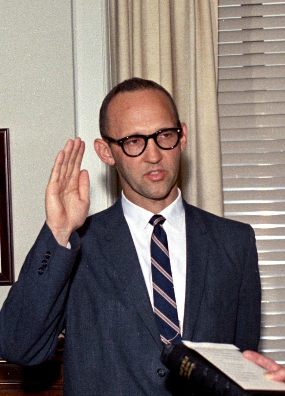John McNaughton
(government official) | |||||||||||||||||||||||||
|---|---|---|---|---|---|---|---|---|---|---|---|---|---|---|---|---|---|---|---|---|---|---|---|---|---|
 | |||||||||||||||||||||||||
| Born | November 21, 1921 | ||||||||||||||||||||||||
| Died | July 19, 1967 (Age 45) | ||||||||||||||||||||||||
Cause of death | plane crash | ||||||||||||||||||||||||
| Nationality | US | ||||||||||||||||||||||||
| Alma mater | DePauw University, Harvard Law School, Oriel College (Oxford) | ||||||||||||||||||||||||
| Member of | Rhodes Scholar/1948 | ||||||||||||||||||||||||
| Interests | • Marshall Plan • Thomas Schelling | ||||||||||||||||||||||||
| Party | Democrat | ||||||||||||||||||||||||
US government official who was Assistant Secretary of Defense for International Security Affairs and Robert S. McNamara's closest advisor in bombing Vietnam. Died in a plane crash at age 45, just before he was to become Secretary of the Navy, and just after attending the 19967 Bilderberg meeting.
| |||||||||||||||||||||||||
John Theodore McNaughton was an American government official who was Assistant Secretary of Defense for International Security Affairs[1] and Robert S. McNamara's closest advisor. He died in a plane crash at age 45, just before he was to become Secretary of the Navy,[1] and just after attending the 19967 Bilderberg meeting.
Early life
John McNaughton was born in Bicknell, Indiana; his father owned the Bicknell Daily News. The family moved to Pekin, Illinois in his younger years because his father later owned the Pekin Daily Times.[2] John McNaughton graduated in 1942 from DePauw University. He joined the United States Navy that year and served on ships in the Atlantic. In 1946, he entered the Harvard Law School graduating in 1948. He was named a Rhodes Scholar that same year and spent 1949 at Oriel College, Oxford.
Career
In 1950, he took a position in the European Payments Union under the Marshall Plan.
He returned to the United States in 1951 and became editor of the Pekin Daily Times.[2] A year later, he ran for congress in the Illinois's 18th congressional district as a Democrat,but was defeated.
McNaughton began his career as an academic as an associate professor at the Harvard Law School in 1953. Major General Charles J. Timmes later said that McNaughton, during a discussion of the Vietnam War, had asserted that one could find the solution to any problem "by simply dissecting it into all its elements and then piecing together the resultant formula".[3]
He had been friends with strategic theorist (and later Nobel prize winner in economics) Thomas Schelling since they worked in the administration of the Marshall Plan in Paris.
By May 1962, he had become General Counsel at the Department of Defense,[4] where he was involved in the Cuba crisis and the planning of the blockade of Cuba[5].
In 1964, when McNaughton and Schelling were teaching at Harvard, Schelling was asked to work at the Department of Defense. He suggested McNaughton go instead, promising to advise McNaughton on weapons and strategy; McNaughton was appointed Assistant Secretary of Defense for International Security Affairs.
Together, they outlined a bombing strategy to intimidate North Vietnam in the spring of [[1964], leading to the first phase of Operation Rolling Thunder which took place between March 2 and 24, 1965.[6]
The conditions for a bombing halt, outlined in a confidential memorandum by McNaughton to McNamara were that North Vietnam must not only cease infiltration efforts, but also take steps to withdraw troops currently operating in South Vietnam. In addition, the Viet Cong should agree to terminate terror and sabotage activities and allow Saigon to exercise "governmental functions over substantially all of South Vietnam."[7]
The North Vietnamese did not react to the bombing in the ways the American officials expected. North Vietnam was not intimidated by the bombing. Political reality had proved more complex than the abstract models of game theory.[6]
In 1966 McNaughton and his deputy Adam Yarmolinsky had to admit, in a JASON study[8], that the air strikes had failed.[9]
McNaughton suggested that one aspect of the war effort was to South Vietnam into a viable political society, able to stand without U. S. help. McNaughton was thinking of the nation-building strategy devised by the Major-General Edward Lansdale, who had become a counterinsurgency expert after defeating the Huk rebellion in the Philippines in the 1950s,[10] Sir Robert Thompson — a British counter-insurgency expert and Roger Hilsman — a former American OSS operative in Burma and the director of intelligence for the Department of State in the Kennedy administration. Edward Lansdale had made the point that the South's dependency on aid had the effect of placing the U.S. in the position of providing major help on an endless basis, with the consequence that if such aid were lessened then the enemy would win.[11]
McNamara confided privately that McNaughton could have been his choice to replace him as Secretary of Defense. McNaughton resigned from the post of Assistant Secretary of Defense and was to become Secretary of the Navy on August 1, 1967 after being confirmed by the United States Senate. However, he was killed in the Piedmont Airlines Flight 22 accident with his wife and younger son Theodore on July 19, 1967.[12]
Personal life
He was married to Sarah Elizabeth "Sally" Fulkman (born February 14, 1921). They had two sons, Alexander "Alex" and Theodore "Ted" (born July 23, 1955).
Event Participated in
| Event | Start | End | Location(s) | Description |
|---|---|---|---|---|
| Bilderberg/1967 | 31 March 1967 | 2 April 1967 | St John's College (Cambridge) UK United Kingdom | Possibly the only Bilderberg meeting held in a university college rather than a hotel (St. John's College, Cambridge) |
References
- ↑ a b https://web.archive.org/web/20081228003142/http://www.history.army.mil/books/Last_Salute/Ch27.htm
- ↑ a b https://www.pekintimes.com/article/20110129/NEWS/301299988
- ↑ http://www.cnn.com/ALLPOLITICS/1996/analysis/back.time/9606/28/index.shtml
- ↑ https://www.jfklibrary.org/asset-viewer/archives/jfkwhp-1962-07-05-d#?image_identifier=JFKWHP-ST-C4-1-62
- ↑ https://www.jfklibrary.org/sites/default/files/archives/JFKOH/McNaughton,%20John%20T/JFKOH-JTM-01/JFKOH-JTM-01-TR.pdf
- ↑ a b http://www.policyreview.org/jun01/cooper.html
- ↑ https://web.archive.org/web/20060827213642/http://www.historychannel.com/tdih/tdih.jsp?category=vietnamwar
- ↑ http://thebulletin.metapress.com/content/q8u90n0552435394/
- ↑ https://web.archive.org/web/20080725035449/http://history.sandiego.edu/gen/20th/LBJ/lbj-vietnam.html
- ↑ https://web.archive.org/web/20051215112230/http://reason.com/0206/cr.my.the.shtml
- ↑ https://web.archive.org/web/20060830101652/http://grunt.space.swri.edu/gilbert1.htm
- ↑ https://www.blueridgenow.com/news/20180719/51-years-later-look-back-at-flight-22-disaster-over-hendersonville
Wikipedia is not affiliated with Wikispooks. Original page source here